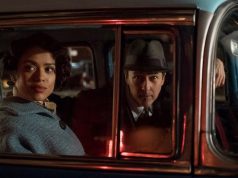The acclaimed Spanish film director Pedro Almodóvar channels another legend, Alfred Hitchcock, in “Bad Education,” a ribald story of desire, lust and obsession. Hitch knew these topics well, of course, though the social mores of his day didn’t allow him to be very explicit about it.
Times are different now, and Almodóvar (never one to shy away from explicitness) can and does give us all the sexual details. What makes the film intriguing, and more to the point Hitchcockian, is the careful way he reveals the facts, and people’s identities, and their relationships to each other. The film is not as straightforward as it first appears; it is film noir at its noirest, and the leggy dame who slinks into the man’s office to start trouble is a transvestite.
It begins in 1980 in the Madrid office of filmmaker Enrique Goded (Fele Martinez). He is scanning the newspapers, looking for stories that might make interesting films, when he is visited by a ghost from his past. It is Ignacio (Gael Garcia Bernal), who now calls himself Angel, with whom Enrique went to Catholic school as a youth. Ignacio and Enrique were each other’s first love back in school, but have had no contact since then. Flashbacks coming later in the film will tell us more of what happened to them.
Ignacio — er, Angel — gives Enrique a story he’s written, a sort of autobiography with some embellishment, which we see enacted in the cinema of Enrique’s mind as he reads it. In the story, Angel performs as a drag queen named Zahara and occasionally uses his pretty face to hook up with men for purposes of robbing them. In his spare time, he confronts a priest from his old school (Daniel Gimenez Cacho) with a bit of blackmail, but does so as Zahara, telling the priest that Ignacio is dead.
Enrique knows a good film idea when he reads one, so he offers to write and direct a movie based on Angel’s story. One thing he does not stop to consider is that the author of an autobiographical story in which the protagonist is a hustler and a blackmailer might not be the best person to go into business with. But oh well.
Angel is thrilled to have his work turned into a movie, and he and Enrique begin a tentative friendship once again. He insists he wants to play the lead character, but Enrique tells him he’s too manly to play a transvestite — even though it was Angel whom Enrique imagined playing Zahara when he read the story, and he looked pretty good as a drag queen (or at least he did in Enrique’s imagination). Enrique pictured Angel’s sex scene pretty vividly, too, and continues to lust after the real-life Angel, the grown-up version of the boy he loved during his own boyhood. But Angel seems different now; something is askew.
To reveal any more of the plot would be both unfair and unwise, because I’m sure I would tell it wrong anyway. It becomes labyrinthine, full of twists and surprises, with people’s motivations and actions being second-guessed.
Through it all, Almodóvar keeps a steady hand on the proceedings, directing with his usual confidence and style, apparently fully capable of taking on favorable comparisons to Hitchcock. Garcia Bernal and Martinez both give smooth performances, though it is probably the former who will garner the most attention for his extra duty as a cross-dresser, a gay man and a zealous writer. Garcia Bernal’s characters in films such as “Amores Perros,” “Y Tu Mamá¡ Tambien” and “The Motorcycle Diaries” often have an angelic soulfulness to them. In this case, he’s actually playing one named Angel, and wouldn’t you know it, this is the time the name turns out to be ironic.
B (1 hr., 45 min.; Spanish with subtitles; )





